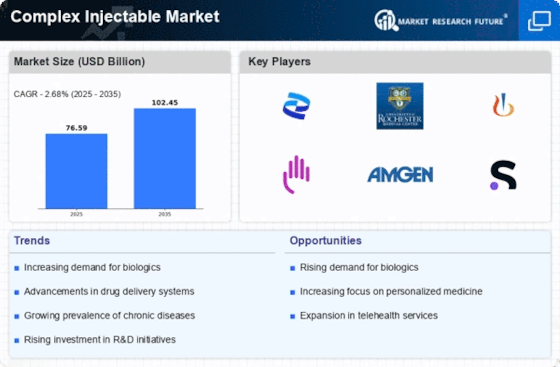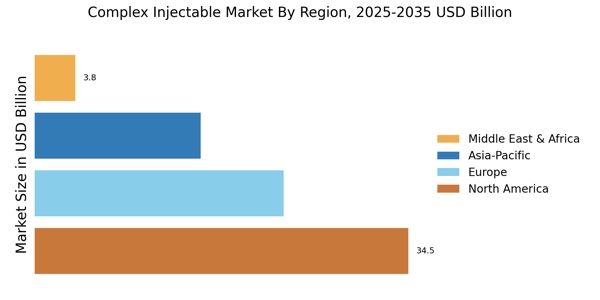Growing Demand for Biologics
The rising demand for biologics is a crucial factor propelling the Complex Injectable Market. Biologics, which are often administered via injection, are becoming increasingly popular due to their targeted action and reduced side effects compared to traditional pharmaceuticals. The market for biologics is expected to reach over 500 billion dollars by 2025, reflecting a robust growth trajectory. This surge is likely to be driven by the increasing prevalence of diseases that require biologic therapies, such as rheumatoid arthritis and multiple sclerosis. Consequently, the Complex Injectable Market is poised to benefit from this trend, as more biologics enter the market and require sophisticated delivery mechanisms.
Rising Prevalence of Chronic Diseases
The increasing incidence of chronic diseases such as diabetes, cancer, and autoimmune disorders is a primary driver of the Complex Injectable Market. As these conditions require long-term management, the demand for complex injectables, which often provide targeted therapies, is likely to rise. According to recent data, chronic diseases account for approximately 70% of all deaths, underscoring the urgent need for effective treatment options. This trend suggests that healthcare providers are increasingly turning to complex injectables to address the complexities of these diseases, thereby propelling market growth. Furthermore, the complexity of treatment regimens necessitates advanced delivery systems, which are characteristic of the Complex Injectable Market.
Advancements in Drug Delivery Technologies
Innovations in drug delivery technologies are significantly influencing the Complex Injectable Market. The development of novel delivery systems, such as microneedles and smart injectors, enhances the efficacy and patient compliance of injectable therapies. These advancements not only improve the pharmacokinetics of drugs but also reduce the frequency of administration, which is particularly beneficial for patients with chronic conditions. Market data indicates that the injectable drug delivery segment is projected to grow at a compound annual growth rate of over 10% in the coming years. This growth is indicative of the increasing reliance on complex injectables as a preferred mode of therapy, thereby driving the overall market.
Regulatory Support for Innovative Therapies
Regulatory bodies are increasingly supportive of innovative therapies, which is positively impacting the Complex Injectable Market. Initiatives aimed at expediting the approval process for complex injectables are becoming more common, allowing for faster access to new treatments. This regulatory environment encourages pharmaceutical companies to invest in research and development of complex injectables, knowing that their innovations may receive quicker market entry. For instance, the introduction of breakthrough therapy designations has facilitated the development of complex injectables that address unmet medical needs. As a result, the Complex Injectable Market is likely to experience accelerated growth due to this favorable regulatory landscape.
Increased Focus on Patient-Centric Solutions
The shift towards patient-centric healthcare solutions is driving the Complex Injectable Market. Healthcare providers are increasingly prioritizing treatments that enhance patient experience and adherence. Complex injectables, which often offer convenience and improved outcomes, align well with this trend. The market is witnessing a growing emphasis on personalized medicine, where therapies are tailored to individual patient needs. This focus is likely to lead to the development of more complex injectable formulations that cater to specific patient populations. As a result, the Complex Injectable Market is expected to expand as stakeholders recognize the importance of patient-centric approaches in treatment regimens.

















